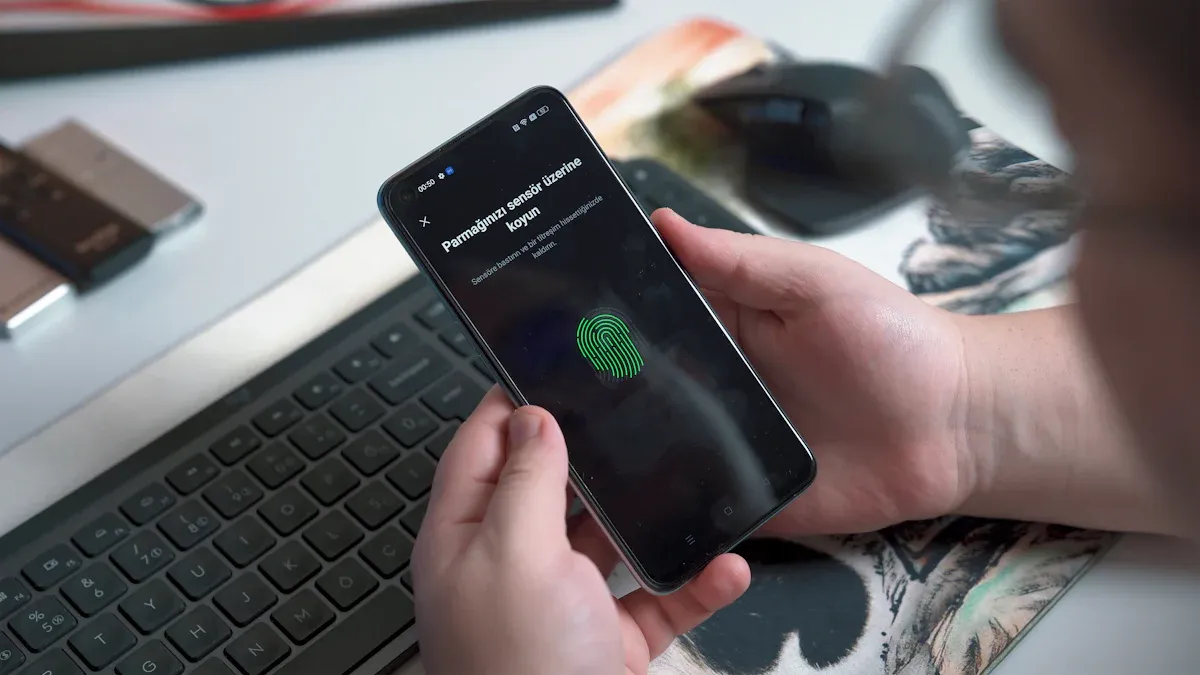- EasyCard
- Trade
- Help
- Announcement
- Academy
- SWIFT Code
- Iban Number
- Referral
- Customer Service
- Blog
- Creator
How Alipay Uses Encryption and Biometrics to Protect Your Data

Image Source: pexels
You may wonder, is alipay safe for your daily transactions? The answer is yes. Alipay combines advanced encryption with biometrics to secure your data at every step. When you use Alipay, the system protects your information with strong encryption and stores your palm print data locally, never sharing it with third parties. The PL1 palm print payment system uses two layers of biometric checks, making it much harder to fake than standard fingerprints. Alipay safety standards comply with China’s strict regulations, so you can trust how does alipay work to keep your payments secure. If you ask, is alipay safe, you can see how does alipay work with both technology and policy to give you confidence. Alipay leads the way in payment security, and how does alipay work proves it every time you make a transaction.
Key Takeaways
- Alipay uses strong encryption and biometric checks to keep your payment data safe from fraud and theft.
- The platform protects your personal information by following strict privacy laws and giving you control over your data.
- Two-factor authentication with face or palm recognition adds extra security to your account and payments.
- Alipay’s real-time monitoring and AI detect suspicious activity quickly to prevent unauthorized access.
- You can help protect your account by using official apps, updating passwords, and watching for scam attempts.
Alipay Safety Overview
Is Alipay Safe?
You want to know, is alipay safe for your transactions and personal information? Alipay safety stands on a strong risk management framework and strict compliance with laws. When you use Alipay, you benefit from a multi-layered approach that protects your account and data at every step.
Alipay’s risk management framework includes several advanced components:
- AlphaRisk AI-powered risk engine
- Real-time fraud detection and pattern recognition
- Dynamic adjustment of risk profiles using self-learning models
- Automatic identification of new fraud patterns
- Over 200 algorithms working together to apply the best risk management strategies
- Real-time response and automatic adjustments
- The system reacts to new risks within one second
- Automatic risk profile updates happen within a day
- 100% money-back protection scheme
- If someone uses your account without permission, Alipay guarantees full reimbursement
- Dynamic verification and real-time transaction protection
- The system uses dynamic verification to protect every transaction
- Advanced encryption and real-time monitoring
- Your data stays protected with state-of-the-art encryption and continuous monitoring
- Comprehensive risk management
- The framework prevents fraud, money laundering, and abuse, using AI and big data
Alipay safety also relies on several security pillars:
- Advanced encryption keeps your payment details safe, so merchants never see your sensitive bank information.
- Biometric verification uses fingerprint or face ID, with Liveness Detection to stop unauthorized access.
- Real-time risk monitoring checks user behavior and flags unusual activity.
- Multi-factor authentication requires both passwords and biometrics.
- Anti-fraud programs include real-time alerts, temporary freezes, and a dedicated team.
- Regulatory compliance ensures Alipay meets strict Anti-Money Laundering (AML) and Know Your Customer (KYC) standards.
- International payment regulations, such as PSD2 and PCI DSS, guide secure cross-border transactions.
Alipay safety does not stop at technology. The company undergoes independent security audits and holds certifications that prove its commitment. For example, Alibaba Cloud, which supports Alipay, has earned global certifications like ISO/IEC 27001, PCI 3DS, and SOC 2. These certifications show that Alipay follows international best practices for information security.
| Certification Category | Examples of Certifications and Audits |
|---|---|
| Global Certifications | ISO/IEC 27001, PCI 3DS, SOC 2, ISO 27701, ISO 27018, ISO 9001 |
| Regional Certifications | MTCS (Singapore), MLPS 2.0 (China), NIST (US), K-ISMS (Korea) |
| Industry-Specific Certifications | HIPAA (US), TISAX (Germany), OSPAR (Singapore), COPPA (US) |
You can trust that Alipay safety measures meet the highest standards. When you ask, is alipay safe, you see that the answer comes from both advanced technology and strict compliance.
Data Protection Principles
Alipay safety also depends on strong data protection principles. You have control over your personal information, and Alipay works to keep your data private and secure.
- Alipay keeps your personal data confidential and only shares it with third parties when required by law or with your consent.
- Third parties must follow strict laws and take steps to protect your information.
- You can access, update, or correct your personal data at any time.
- Alipay only shares data for specific business needs, such as insurance or financial services, and always with your consent.
- The company does not transfer your data unless you agree, or if required by law, or in special cases like mergers, with continued protection.
- Public disclosure of your information is rare and only happens with your consent or for special events.
- Alipay may let affiliates or professional agencies process your data, but only under strict confidentiality.
- The privacy policy updates regularly to reflect new laws and practices, and you receive notifications about changes.
- Special rules protect minors’ data, requiring parental consent and limiting use.
Alipay collects only the data needed to provide services or as allowed by law. If you do not want your data used for marketing, you can opt out or change your preferences. Trusted partners must keep your data safe and use strong technical measures. Alipay keeps your data only as long as needed for services and legal reasons.
Alipay safety means putting your interests first, building trust, and following the law. The company values transparency and gives you control over your data. When you wonder, is alipay safe, you see that Alipay’s data protection principles work to keep your information secure.
If you want to know how does alipay work, you see that the answer lies in this careful balance of technology, compliance, and user rights. Alipay safety is not just a promise—it is a system built to protect you every time you use the platform.
Encryption Technology

Image Source: unsplash
Data Transmission Security
You trust Alipay with your sensitive information every time you use its payment methods. Alipay uses advanced encryption to protect your data as it travels between your device and its servers. The platform relies on AES-256 encryption, which is one of the strongest encryption standards available. This technology makes unauthorized access extremely difficult. Alipay also uses Secure Socket Layer (SSL) protocols and HTTPS for all data transmissions. These protocols create an encrypted channel that keeps your information confidential and verifies the identity of Alipay’s servers. This approach prevents man-in-the-middle attacks and data tampering.
Alipay updates its security protocols regularly, usually every quarter or half-year. When new threats appear, Alipay may update its systems even more quickly. You benefit from these frequent updates because they help keep your payment methods safe from emerging risks. Alipay also uses dynamic, time-limited QR codes for transactions. These codes reduce the risk of fraud by making each transaction unique and valid for only a short time.
Note: Alipay’s encryption and security practices match the standards used by leading financial services worldwide. You can feel confident that your payment methods are protected by banking-grade technology.
Data Storage Protection
Alipay does not stop at securing data in transit. The platform uses advanced encryption, including AES-256, to protect your information when it is stored on its servers. Tokenization adds another layer of security by replacing sensitive data with random tokens. This means that even if someone accessed the storage, they would not see your real information.
Alipay follows strict legal requirements for data retention, erasure, and anonymization. The company keeps your data only as long as needed for its services or as required by law. If you withdraw your consent or the data is no longer necessary, you can request deletion. When deletion is not possible due to technical reasons or legal obligations, Alipay limits access and uses the data only for storage and cybersecurity purposes.
You have control over your personal data. Alipay’s compliance with China’s Personal Information Protection Law ensures that your rights are respected. This commitment to privacy and security is a key part of how does alipay work to keep your information safe.
Biometric Authentication

Image Source: unsplash
Alipay uses advanced biometric authentication to keep your account secure. When you use Alipay, you benefit from a system that combines biometric verification with passwords. This approach gives you strong protection every time you make a payment or access your account.
Two-Factor Verification
Alipay’s two-factor authentication system uses both biometric verification and password input. You start by using biometric authentication, such as facial recognition. Alipay’s facial recognition system, developed with Face++ and Ant Financial, works on both iOS and Android apps. The “Smile to Pay” feature lets you authorize payments with a quick scan of your face. During beta testing, this system achieved over a 90% success rate. Alipay continues to improve security by adding liveness detection, which stops people from using photos or videos to trick the system.
Alipay also explores new technologies. The company patented a method that combines facial recognition with palm scanning. This system captures both your face and palm data during enrollment. When you pay, Alipay verifies both at the same time. This method increases security, makes payments faster, and keeps the process contactless.
| Aspect | Description |
|---|---|
| Biometric Authentication | Uses facial recognition to verify your identity before payment proceeds. |
| Device-based OTP | After biometric verification, you enter a one-time password from the Alipay app. |
| Privacy and Security | Alipay stores your biometric data securely and encrypts it to meet privacy laws. |
| User Control | You can turn off certain biometric features for privacy. |
| Outcome | The two-factor authentication system reduces fraud and keeps your experience smooth. |
Preventing Unauthorized Access
Alipay uses biometric verification to stop unauthorized access. Your unique physical traits, like your face or palm, make it very hard for others to break into your account. Alipay’s system checks your identity before every transaction. This step helps prevent fraud and keeps your money safe.
Alipay’s multi-layered security includes real-time alerts. If someone tries to access your account, you get a notification right away. The platform uses machine learning to watch for unusual activity. Alipay encrypts your biometric data and stores it securely. You always have control over your information. You can update your settings or disable biometric features if you want more privacy.
Alipay’s focus on biometric verification means you get both convenience and strong protection. The system encourages you to use these features because they are easy and fast. With Alipay, you know your account has the latest security technology working for you.
User Tips for Alipay Safety
Best Practices
You can keep your Alipay account secure by following a few simple steps. Alipay uses advanced encryption and a strong risk management framework to protect your data and payment methods. You play an important role in keeping your information safe.
- Always enable two-factor authentication (2FA) on your Alipay account. This adds an extra layer of security to your payment methods.
- Update your password often. Use a mix of uppercase and lowercase letters, numbers, and symbols. This makes it harder for others to guess your password.
- Only use official Alipay apps and websites. Download the app from trusted sources. Never use links from unknown emails or messages.
- Keep your device’s software up to date. Updates often include important security fixes that help protect your payment methods.
- Never share your Alipay password, verification codes, or personal information with anyone. Even if someone claims to be from Alipay, do not give out sensitive details.
- Review your account activity regularly. If you see anything unusual, report it to Alipay right away.
Tip: Alipay’s real-time monitoring works 24/7 to detect risks and protect your payment methods. You help strengthen this protection by following these best practices.
Recognizing Risks
You need to stay alert to avoid alipay scam attempts. Scammers often try to trick you into giving away your Alipay login details or payment information. They may send fake emails, texts, or even create websites that look like Alipay.
- Check the sender’s details before clicking any link. Alipay will never ask you to confirm your password or payment methods through email or text.
- Watch for urgent messages that pressure you to act quickly. Scammers use fear to make you reveal your information.
- Avoid alipay scam by never entering your Alipay details on unofficial websites. Always check the website address before logging in.
- Use only trusted payment methods when making purchases. If a seller asks you to use a different method, stop and check if it is safe.
- If you receive a suspicious message, contact Alipay support directly through the app. Do not reply to the message or share your payment methods.
| Common Scam Signs | What You Should Do |
|---|---|
| Fake Alipay websites | Always check the URL |
| Unusual payment requests | Use official payment methods only |
| Requests for codes/info | Never share with anyone |
You can avoid alipay scam by staying cautious and using only official Alipay payment methods. Alipay provides guidance and support to help you recognize risks and keep your account safe. By following these tips, you make it much harder for scammers to access your payment methods or personal data.
You trust alipay to protect your data every time you make a payment. Alipay uses strong encryption and advanced biometrics to keep your information safe. Alipay addresses user concerns about privacy by letting you control data sharing with mini-programs. Alipay’s User Protection Center helps you manage permissions and aligns with China’s Personal Information Protection Law. Alipay uses AI for real-time fraud detection and offers two-factor authentication. Alipay’s secure payment system keeps sensitive data off merchant servers. Alipay’s risk management and emergency plans prevent unauthorized access. Alipay encourages you to use biometric authentication and review your privacy settings. Alipay’s ongoing updates and compliance with global standards show a strong commitment to your safety. Alipay’s security features protect you and give you peace of mind. Alipay remains a trusted choice for secure payments.
FAQ
How does alipay protect my payment information?
Alipay uses strong encryption and biometric authentication to secure your payment information. You get extra protection with two-factor verification. The system never shares your sensitive data with merchants or third parties.
Can I use alipay with a Hong Kong bank account?
Yes, you can link your Hong Kong bank account to alipay. The platform supports many international banks. You can make payments, transfer funds, and check your balance in USD. Always check the latest exchange rates for accurate conversions.
What should I do if I suspect unauthorized activity on my alipay account?
If you notice any unusual activity, contact alipay support immediately. Use the app’s security center to freeze your account. Change your password and review your recent transactions. Alipay’s team will help you resolve the issue quickly.
Does alipay store my biometric data securely?
Alipay stores your biometric data using advanced encryption. The system keeps this information safe and private. You control your biometric settings and can disable features at any time. Alipay follows strict privacy laws in China.
How can I avoid scams when using alipay?
Always use the official alipay app or website. Never share your password or verification codes. Watch for fake messages or websites. If you receive a suspicious request, report it to alipay support. Stay alert to keep your account safe.
Alipay shows how technology and compliance can make digital payments more secure. But when it comes to managing your own cross-border transfers, you deserve the same level of transparency and reliability.
With BiyaPay, you benefit from international remittance fees as low as 0.5%, real-time exchange rates you can always check, and the assurance of same-day arrival when requirements are met. A fast, easy registration process makes it simple to start.
Register with BiyaPay today and experience cross-border payments designed for both security and convenience.
*This article is provided for general information purposes and does not constitute legal, tax or other professional advice from BiyaPay or its subsidiaries and its affiliates, and it is not intended as a substitute for obtaining advice from a financial advisor or any other professional.
We make no representations, warranties or warranties, express or implied, as to the accuracy, completeness or timeliness of the contents of this publication.




Contact Us
Company and Team
BiyaPay Products
Customer Services
is a broker-dealer registered with the U.S. Securities and Exchange Commission (SEC) (No.: 802-127417), member of the Financial Industry Regulatory Authority (FINRA) (CRD: 325027), member of the Securities Investor Protection Corporation (SIPC), and regulated by FINRA and SEC.
registered with the US Financial Crimes Enforcement Network (FinCEN), as a Money Services Business (MSB), registration number: 31000218637349, and regulated by FinCEN.
registered as Financial Service Provider (FSP number: FSP1007221) in New Zealand, and is a member of the Financial Dispute Resolution Scheme, a New Zealand independent dispute resolution service provider.




















